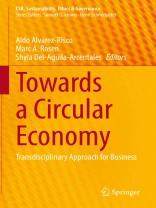This volume presents a transdisciplinary approach to implementing a circular economy in international business. Written by global experts, this book provides a detailed and professional focus on issues that must be improved in order to successfully implement a circular economy in a variety of industries.
The book begins with a discussion of the theoretical aspects of circular economy and the challenges of going from theory to practice. The following chapters present case studies on the circular economy in different sectors of international business such as food systems, mineral processing, water management, energy process, waste management, the cement industry, and 3D printing. Issues such as the role of SMEs in the circular economy, and the progress towards circular economy 3.0, and strategies for teaching the circular economy are also discussed. The volume ends with a critique of the concept of circular economy and suggestions for future research avenues.
Written with multiple stakeholders in mind, this volume will be of interest to researchers and students of economics, sustainability, international business, and management as well as industry professionals and governments working towards establishing a circular economy in their fields and jurisdictions.
Cuprins
Chapter 1: Introduction.- Chapter 2: Circular Economy research: From theory to practice.- Chapter 3: Conceptualization of Circular Economy 3.0: synthesizing the 10Rs hierarchy of value retention options.- Chapter 4: Working with new conceptualization of Circular Economy 3.0.- Chapter 5: The circular economy: a critique of the concept.- Chapter 6: Waste management and circular economy.- Chapter 7: The Circular Economy and Energy.- Chapter 8: Supply chain and circular economy.- Chapter 9: Public Policy for Circular Economy: The case of the National Strategy of Circular Economy in Colombia.- Chapter 10: Circular economy as mechanism of resilience against COVID-19.- Chapter 11: Limits to Sustainable Development Goals: Discussing lessons from case studies in (un)sustainable production.- Chapter 12: University contributions to the Circular economy.- Chapter 13: Dissemination of Circular Water Practices in Colombia.- Chapter 14: The Circular Economy – United Kingdom.- Chapter 15: Implementation and scalability of circular practices in the leather tanning industry: evaluation of a Colombian tannery.- Chapter 16: Recycling and Circular Economy in Peru.- Chapter 17: X Economies: Towards Policy Intelligence among Economy Visions and Practices in Europe and Latin America.- Chapter 18: Globalization of Circular economy.- Chapter 19: Closing Remarks.- Index.
Despre autor
Aldo Alvarez-Risco is an Associate Professor of International Business and coordinator of the Global Logistics and Supply Chain Management Research Group at Universidad de Lima in Perú. He is also Ph D at Universidad Autónoma de Nuevo León, Doctor in Pharmacy and Biochemistry, Master in Pharmacology and Pharmacist at the Universidad Nacional Mayor de San Marcos and Master Pharmaceutical Care at Universidad de Granada. He is the coordinator of the South American Network of Pharmaceutical Care (REDSAF). Dr. Alvarez-Risco is the author of various books and articles, and has been a speaker at academic events in 22 countries. He has experience as a speaker for radio and TV appearances.
Marc A. Rosen is a Professor at University of Ontario Institute of Technology in Oshawa, Canada, where he served as founding Dean of the Faculty of Engineering and Applied Science. Dr. Rosen has served as President of the Engineering Institute of Canada and the Canadian Society for Mechanical Engineering. He has held many professional roles, including Editor-in-Chief of various journals and Director of Oshawa Power and Utilities Corporation. With over 70 research grants and contracts and 900 technical publications, Dr. Rosen is an active teacher and researcher in energy technology, sustainable energy, and energy systems’ environmental impact. Much of his research has been carried out for industry. Dr. Rosen has worked for Imatra Power Company in Finland, Argonne National Laboratory near Chicago, the Institute for Hydrogen Systems near Toronto, and Ryerson University in Toronto. He has received numerous awards and honors.
Shyla Del-Aguila-Arcentales is a researcher in the sustainability area. She completed a doctoral program and is Master in Pharmaceutical Sciences at the Universidad Nacional Mayor de San Marcos and she is Pharmacist at Universidad Nacional de la Amazonia Peruana. She is linked to the ancestral knowledge of medicinal plants inthe jungle regarding traditional uses and for industrial process. Also, she has experience in bio-business, audit, environmental management, and import-export management. She is co-editor of books published by Springer and author of different articles in Scopus and Web of Science.












